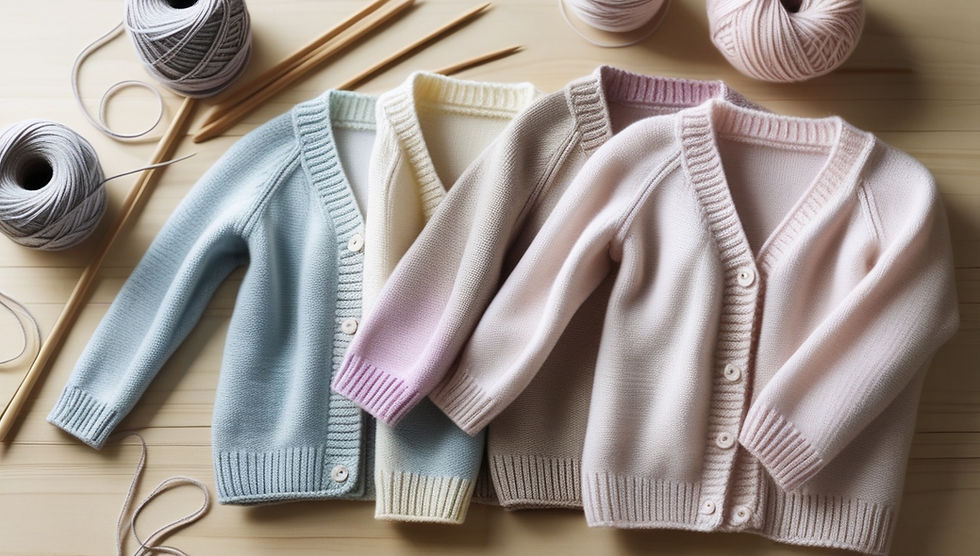The Rise of Private Label Cardigans: Opportunities for Fashion Brands
- yhknits
- Aug 25
- 4 min read
In today’s competitive fashion landscape, consumers are seeking clothing that not only looks stylish but also reflects individuality, quality, and brand identity. Among the most versatile wardrobe essentials, the cardigan has experienced a resurgence, blending timeless appeal with modern design innovations. For fashion brands, this growing demand presents an exciting opportunity: private label cardigans. By working directly with a trusted cardigan sweater manufacturer, brands can create unique knitwear collections tailored to their customers’ tastes, while also strengthening brand loyalty and improving profitability.
What Are Private Label Cardigans?
Private label cardigans are sweaters designed and produced by a third-party manufacturer but sold under a retailer’s or brand’s label. Unlike wholesale products, private label knitwear allows a brand to customize designs, fabrics, fits, and trims, ensuring exclusivity in the marketplace. For example, a boutique may want a cropped, oversized cardigan with chunky buttons, while a lifestyle brand might prefer lightweight cotton cardigans in neutral palettes. With private labeling, each company can align its knitwear line with its identity and customer base.
This model has become increasingly popular as fashion brands seek greater control over product development, quality, and pricing. Instead of selling generic cardigans found in multiple stores, private label collections allow brands to stand out with distinctive offerings.
Why Private Label Cardigans Are in Demand
Customization and Differentiation In a saturated market, differentiation is key. Private label allows brands to create cardigans that reflect unique aesthetics, whether minimal, bold, sustainable, or luxury-inspired. From yarn selection to button styles, every element can be customized to tell the brand’s story.
Higher Profit Margins With private label, brands bypass middlemen and wholesalers, working directly with manufacturers. This often leads to lower production costs and higher profit margins, while still offering premium-quality knitwear to customers.
Brand Exclusivity When customers purchase a cardigan available only through a specific brand, they associate that exclusivity with prestige and trust. Unlike off-the-shelf wholesale products, private label sweaters build brand recognition and loyalty.
Agility in Trends Cardigans have evolved beyond the classic button-down. Cropped, belted, oversized, and even zip-up variations are trending globally. Private label programs enable brands to react quickly, producing seasonal or limited-edition collections that match evolving fashion trends.
Sustainability as a Selling Point Today’s conscious consumers want to know where their clothing comes from. Brands that partner with ethical manufacturers can highlight sustainable sourcing, fair labor, and eco-friendly yarns in their private label collections, appealing to environmentally aware buyers.
Opportunities for Fashion Brands
1. Expanding Product Lines Seamlessly
Private label cardigans give brands a chance to expand beyond their core offerings without reinventing the wheel. A denim-focused label, for instance, can introduce cozy knitwear to complement jeans, while a luxury accessories brand might offer high-end cashmere cardigans as part of a lifestyle collection.
2. Building Seasonal Collections
Cardigans are one of the few fashion items that transition smoothly across seasons. Lightweight cotton cardigans work for spring, chunky knits for winter, and cropped versions for summer evenings. By launching seasonal collections, brands can keep customers engaged year-round.
3. Leveraging the Athleisure and Work-From-Home Market
With the rise of remote work, consumers want versatile, comfortable, yet stylish apparel. Cardigans bridge the gap between loungewear and office attire, making them a perfect addition to modern wardrobes. Fashion brands that offer private label cardigans designed for comfort and style can capture this growing market segment.
4. Capitalizing on Customization Trends
Monogrammed initials, personalized labels, and limited-edition collaborations are gaining popularity. Private label programs allow brands to create these exclusive products, boosting customer engagement and perceived value.
5. Global Market Expansion
Cardigans are universally appealing, worn by men, women, and children across different cultures. Private label production enables brands to scale their operations and explore new markets by tailoring designs to local tastes. For example, Scandinavian markets may prefer minimalist wool designs, while Asian markets might lean toward lightweight pastel knits.
Choosing the Right Cardigan Sweater Manufacturer
Success in private label knitwear largely depends on selecting the right manufacturing partner. A reliable cardigan sweater manufacturer offers not just production capacity but also design guidance, fabric sourcing, and quality assurance.
Key factors to consider include:
Experience in Knitwear – Manufacturers specializing in sweaters understand yarn properties, knitting techniques, and finishing touches essential for durability and comfort.
Customization Capabilities – The ability to modify fabric blends, patterns, and trims ensures the product aligns with the brand’s vision.
Minimum Order Quantities (MOQs) – Depending on the brand’s size, flexible MOQs are important for testing new designs without overcommitting resources.
Ethical and Sustainable Practices – Increasingly, consumers demand transparency. Brands benefit from working with manufacturers who prioritize eco-friendly materials and fair labor.
Scalability – As demand grows, the manufacturer should be able to scale production without compromising quality.
The Future of Private Label Cardigans
The private label model is no longer limited to large retailers; it has become accessible to emerging designers, boutique stores, and e-commerce entrepreneurs. Digital tools, smaller MOQs, and faster supply chains empower even small brands to launch their own cardigan collections.
Looking ahead, innovations like 3D knitting, recycled yarns, and smart textiles will further enhance the appeal of private label cardigans. Brands that seize these opportunities today will be better positioned to lead tomorrow’s fashion market.
Conclusion
The cardigan’s revival is more than just a passing trend—it reflects a broader shift toward versatile, personalized, and sustainable fashion. For brands, private label cardigans represent an incredible opportunity to differentiate, expand product lines, and strengthen customer relationships. By collaborating with an experienced cardigan sweater manufacturer, fashion businesses can bring their creative visions to life while building long-term value in an increasingly competitive industry.
Private label cardigans aren’t just about sweaters; they’re about branding, identity, and the future of fashion retail.





Comments